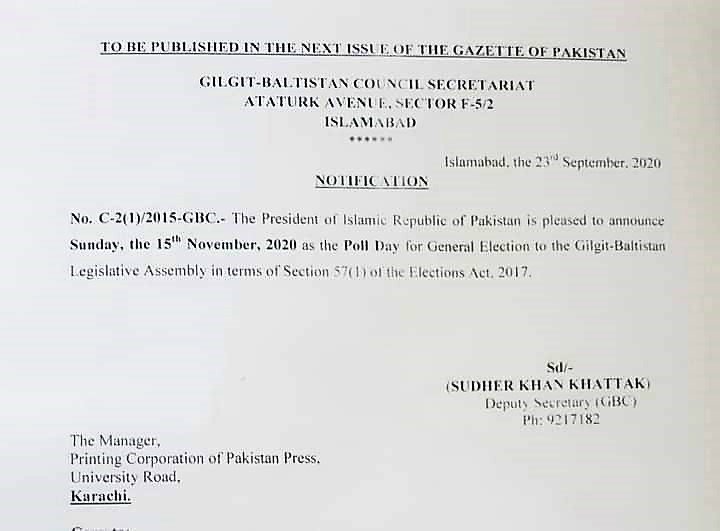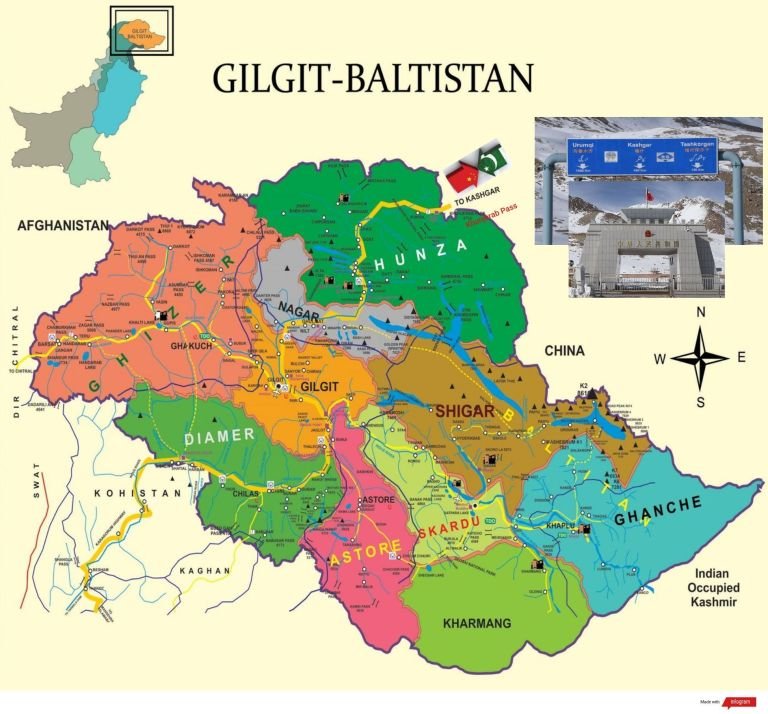President Arif Alvi assents summary; govt weighs in on a proposal to give provisional province status to GB with representation in parliament
High Asia Herald Report
ISLAMABAD: General elections for the Gilgit-Baltistan Legislative Assembly (GBLA) will be held on November 15, according to a summary moved by the government and approved by President Arif Alvi on Wednesday.
The notification comes amid a plethora of rumours in power corridors on the constitutional status of the disputed region triggering a debate in mainstream and social media.

Rumours are rife that the establishment and government are weighing a proposal to give provisional provincial status to Gilgit-Baltistan with representation in all constitutional bodies including the parliament as observers.
“The government has decided to give full-fledge provincial status to the GB with all constitutional rights, including representation in the Senate and the National Assembly,” reported Express Tribune quoting Minister for Kashmir and Gilgit-Baltistan Affairs Ali Amin Gandapur.
The minister had said that the premier would soon visit the region and make the formal announcement in this regard.
“After consultation with all stakeholders, the federal government has decided in principle to give constitutional rights to Gilgit-Baltistan,” the minister told a group of journalists from G-B.
However, Gandapur emphasised that after the grant of constitutional rights, the subsidy on wheat and tax exemptions given to the region would not be withdrawn,” he added.
On September 22, parliamentary leaders had called on Chief of Army Staff (COAS) General Qamar Javed Bajwa and Inter-Services Intelligence Director General Lt-Gen Faiz Hameed to discuss administrative matters of GB among other issues.
It was reported that the proposal to make GB a new province was agreed upon in the meeting.
According to a source privy to the meeting, the opposition leaders wanted to announce the new arrangement after GBLA elections.
However, PML-N Vice-President Maryam Nawaz on Wednesday refuted any such decision, saying “political decisions should be made in the parliament, not at the General Headquarters (GHQ)”.
Maryam, who was at the Islamabad High Court for a hearing of an appeal against her conviction in the Avenfield reference, was responding to a question from a reporter about Army Chief and head of the ISI Lt-Gen Faiz Hameed’s meeting with key opposition figures after the All-Parties Conference called by Pakistan Bar Council on Sept 17.
گلگت بلتستان کہ اشو پر انھیں بلایا گیا تھا لیکن یہ ایک سیاسی اشو ہے عوامی نمائندوں کا اشو ہے
— Syed Kousar Kazmi (@SyedKousarKazmi) September 23, 2020
میں سمجھتی ہوں یہ فیصلے جی ایچ کیو میں نہیں پارلیمنٹ میں ہونے چاہییں
نہ ان اشوز پر سیاسی قیادت کو بلانا چاہیے نہ انھیں جانا چاہیے
جس نے آنا ہے پارلیمنٹ میں آۓ.مریم نواز pic.twitter.com/bDYHpgaKul
“I don’t know about dinner, maybe it was not a dinner [but] I heard about the meeting. From what I understand it was called to discuss Gilgit-Baltistan which is a political issue, an issue of the people’s representatives, for them to solve and deliberate upon.
The September 16 meeting was attended by about 15 opposition figures including Leader of the Opposition in the National Assembly Shahbaz Sharif, Pakistan Peoples Party chairman Bilawal Bhutto-Zardari, Jamaat-i-Islami emir Sirajul Haq, ANP’s Amir Haider Hoti, JUI-F’s Asad Mahmood, PML-N leaders Khawaja Asif and Ahsan Iqbal, PPP’s Senator Sherry Rehman and few government ministers.
Railways Minister Sheikh Rashid, while confirming the meeting and its participants in a conversation with Dawn, said it was held to discuss the impending changes in the constitutional status of Gilgit-Baltistan. However, the opposition used this opportunity to flag its concerns about other matters, especially the military’s alleged interference in politics and allegations of persecution of its leaders on the pretext of accountability.
The timing of the meeting and its disclosure was linked by the onlookers to the opposition’s multiparty conference held here on Sunday in which former prime minister Nawaz Sharif criticised the army, saying there was “a state above the state in the country”.
Criticism by other opposition leaders was, in comparison to Mr Sharif’s remarks, relatively subtle.
A 26-point declaration issued at the end of the meeting, however, contained assertions about ending “establishment’s interference in politics” and “no role of armed forces and intelligence agencies” in future elections.
Mr Rashid said the army chief clearly told the participants of the meeting that the Army was not in any manner linked to the political processes and had no involvement in matters concerning election reforms and accountability.
Gen Bajwa, according to Dawn, categorically conveyed that no one would be allowed to create chaos in the country.
In remarks addressed to JUI-F chief Fazlur Rehman’s son Asad Mahmood, Gen Bajwa, Mr Rashid said, it’s an irony that the same parliament is kosher for Mr Rehman for contesting presidential elections, but it is otherwise unacceptable to him.
The allegations of a political witch hunt in the name of accountability was raised by PML-N’s Ahsan Iqbal.
Responding to him, the army chief said that NAB chief and election commissioner were picked up by political leaders represented in parliament, therefore they needed to be careful in choosing people for such important positions.
A participant, speaking on condition of anonymity said, NAB’s actions had scared the bureaucracy, which is the reason why officials are not taking crucial decisions. Gen Bajwa too had purportedly pointed out that bureaucracy was not delivering.
PML-N remained mum about the participation of its leaders in the meeting.
PPP said it would issue a formal comment on the meeting on Tuesday through its spokesperson Senator Farhatullah Babar. However, Senator Sherry Rehman, participating in a TV talk show, said her party’s chairman talked about the status of Gilgit-Baltistan and its upcoming elections.
She said Mr Bhutto-Zardari stressed on the need for fair and free elections in GB, because of the sensitivities attached to the region.

The High Asia Herald is a member of High Asia Media Group — a window to High Asia and Central Asia

